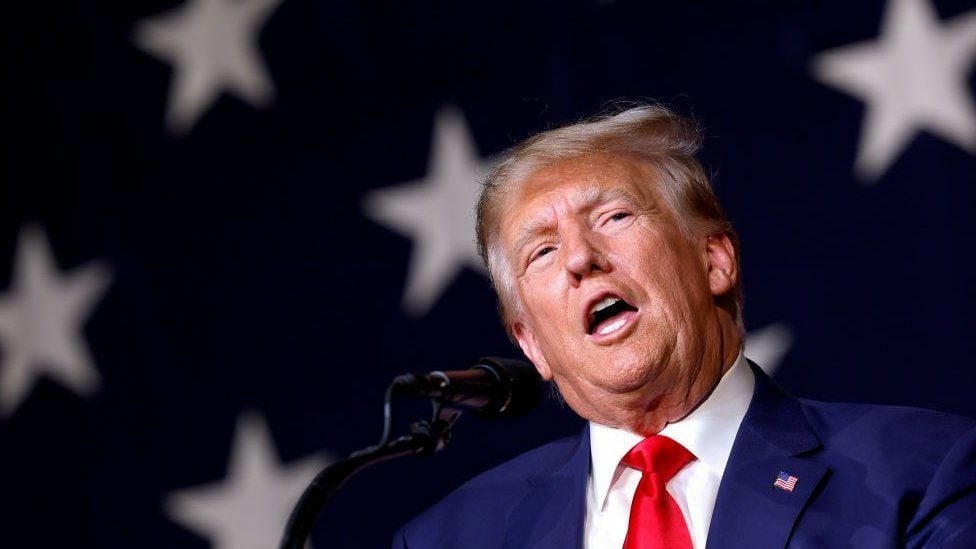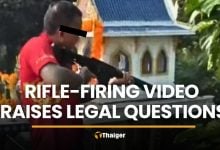Trump pleads not guilty to charges over classified documents

Former US President Donald Trump has entered a not guilty plea in response to criminal charges alleging he unlawfully retained classified documents after leaving the White House. The 37 charges against him include obstructing the government’s attempts to retrieve the files. Prosecutors are pushing for a swift trial now that Trump has made his court appearance; however, legal experts suggest he may attempt to delay the trial as much as possible.
Carl Tobias, a law professor at the University of Richmond in Virginia, said, “He has every incentive to delay,” noting that Trump is campaigning for the Republican presidential nomination and hopes to return to the White House in 2024. Trump’s arraignment in Miami on Tuesday was standard and procedural. He was booked, fingerprinted, and swabbed for DNA before entering his not guilty plea. The court allowed him to leave without imposing travel restrictions for his bail, as he is protected by the Secret Service and not considered a flight risk.
The next step involves obtaining security clearance for Trump’s lawyers, as the case involves highly classified documents. “That takes time,” said Kevin McMunigal, a former federal prosecutor and law professor at Case Western Reserve University in Ohio. Before this can happen, Trump will need to organize his Florida legal team. Two of his attorneys, James Trusty and John Rowley, resigned on Friday, a day after his indictment. Todd Blanche represented the former president during his arraignment on Tuesday, but experts believe he will likely seek to include additional lawyers in the case.
In the meantime, the court will proceed with selecting jury members for the trial. McMunigal noted that federal trials are typically swift, with defendants tried within 90 days of their arraignment in most instances. However, Trump’s case may be an exception due to its high-profile nature and the required security clearances.
Legal experts assert that the indictment against the former president is “incredibly strong” and attempts to dismiss the trial would likely fail. “That’s not to say that he and his lawyers won’t drag this out as long as they possibly can,” Professor Tobias said.
Trump has repeatedly argued that he had the right to take the documents from the White House under the Presidential Records Act and that he had declassified them before leaving office. His lawyers may try to present this argument in court, although Tobias said it is highly unlikely they would receive a favourable ruling. “I don’t believe he had the right to hold on to them after he was no longer president,” Tobias said. “The Records Act is very clear, and I don’t think there is much question about that.”
Trump’s lawyers may also argue that he was a victim of “selective prosecution,” claiming he was unfairly targeted while other politicians, such as Hillary Clinton, Mike Pence, and President Joe Biden, were never charged for their handling of classified documents. However, Tobias said the former president’s case is different in several ways. For example, other politicians were “more than willing” to return any documents they had, while evidence in the indictment shows that Trump resisted.
“The indictment is full of very irresponsible things that Mr Trump allegedly did,” Tobias said, adding that the selective prosecution argument would not go far in court.
Another tactic Trump and his legal team could use to delay the trial is seeking to dismiss evidence presented to the grand jury, specifically testimony from Trump lawyer M Evan Corcoran, under attorney-client privilege. “That might be a pre-trial issue that would cause some delays,” McMunigal said. However, he added that a judge overseeing the case in Washington DC had already ruled the evidence could be included in the indictment under a crime-fraud exception. This exception applies to conversations between a lawyer and a client where the client attempts to obtain legal advice on committing fraud or a crime.
Although experts believe it is unlikely any of these arguments would result in the case being thrown out entirely, they could certainly delay the trial, as the court would need to consider each issue raised by Trump’s lawyers.
Latest Thailand News
Follow The Thaiger on Google News:


























